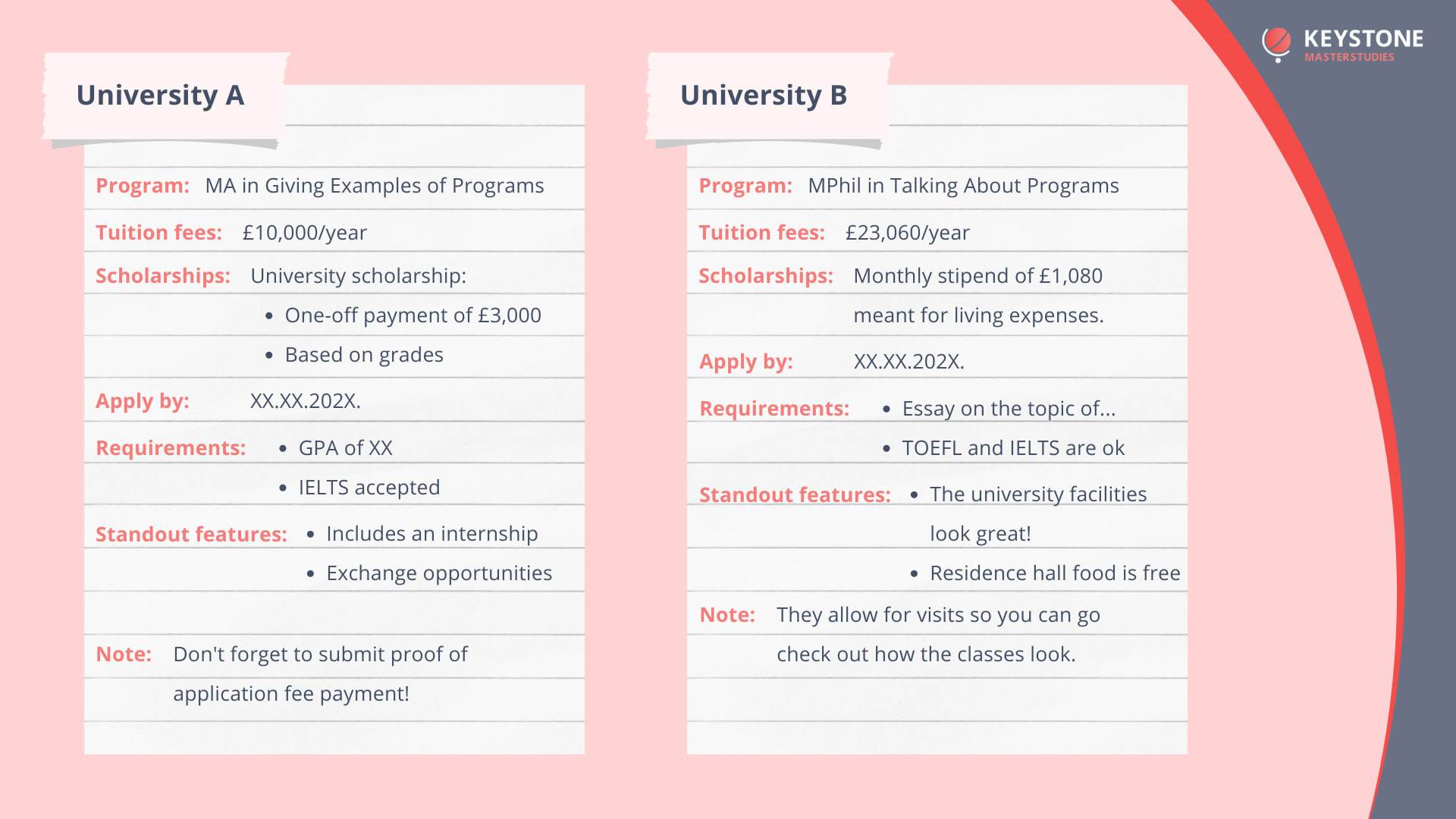The Ultimate Guide to Pursuing a Master's Degree in Germany (2024)
This guide covers everything you need to know as an international student pursuing a Master's degree in Germany: from program research and admission process, to funding options.
- Education
- Study Abroad
- Student Tips

Master's degree in Germany: key info
💰 The cost of studying
Master's studies in German public universities are usually free of charge. Private and specialized programs cost between €7,000 and €15,000 per year.
Read the full cost breakdown ▼
📋 Scholarships for international students
✈️ Visa requirements
To study in Germany, non-EU/EEA citizens need to apply for a Student Visa or a Student Applicant Visa with a valid passport, health insurance, and proof of Financial Resources. The fee is €75.
Germany, recognized globally for its exceptional education system and world-renowned universities, stands as a hotspot destination for international students. It boasts more than 420 higher education institutions with over 21,000 different study programs, and there are over 300,000 international students in Germany each year.
This guide will walk you through the entire process involved in applying for a Master's degree in Germany, so that you are thoroughly equipped and confident as you embark on your academic adventure in Germany.
Ready to apply for programs in Germany?
Browse thousands of Master's programs in Germany!
Discover programs →What's a Master's degree in Germany?
📌 KEY TAKEAWAYS
- German Master's programs are known for their academic rigor and practical approach.
- They typically take one to two years to complete.
- Germany offers numerous English-language Master's programs - often tuition-free.
Renowned for their academic rigor and practical approach, German Master's programs offer a wide array of specializations, catering to your diverse academic interests and career goals.
These programs, typically taking one to two years, blend advanced theoretical knowledge with practical applications, ensuring you gain both depth and real-world skills.
How long does it take to get a Master's degree in Germany?
A Master's degree in Germany usually takes one to two years.
This duration can vary depending on whether you're pursuing a full-time, part-time, or an accelerated track.
Why study in Germany?
Germany is increasingly recognized as an ideal destination for international students like you.
It consistently ranks at the very top of the lists for best study abroad destinations. For example, it ranked 6th on the educations.com 2023 Top 10 Places to Study Abroad list.
Why is the country so popular as a study abroad destination? Germany offers countless Master's programs in English, usually for free, attracting students from all over the world due to its diverse and inclusive academic environment.
Why get a Master’s in Germany?
- Academic excellence: German universities are celebrated for high academic standards and cutting-edge research.
- Career prospects: A degree from a German university is highly valued globally.
- Scholarship opportunities: Germany provides a variety of scholarships for international students.
- Research and industry connections: With programs closely linked to industry, Germany offers excellent opportunities for research and practical experience.
- Diverse program options: There are over 21,000 different study programs in Germany, so you're bound to find a course that resonates with your academic and professional ambitions.
How to choose the right Master’s program in Germany
📌 KEY TAKEAWAYS
- Start your search by defining your academic interests and career goals. This will guide your research on potential programs.
- Organize your search by creating a list of potential universities and their program specifics.
Selecting the ideal Master's program in Germany, with its vast array of universities and courses, can appear overwhelming. Yet, it can be distilled into a few manageable, though not necessarily easy, steps.
Step 1: Define your goals and plans
- What academic field captivates you?
- What career outcomes do you envision from your Master's degree in Germany?
Reflect on your passions, strengths, and long-term career objectives. This introspection will guide you to a program that not only aligns with your interests but also paves the way for the career opportunities you desire.
Step 2: Start researching
Research is crucial in choosing the right Master's program in Germany. Consider the following key aspects:
- University-industry partnerships: Look for affiliations with leading companies, research institutes, or organizations. These connections can provide early career opportunities and valuable networking.
- Curriculum relevance: Ensure the program offers courses and specialized modules that align with your career goals, including opportunities for research or internships.
- Expert faculty: Investigate the faculty's expertise in your chosen field. Consider their research, publications, and any mentorship or assistantship programs available.
- Accreditations and recognition: Seek student testimonials and look for recognized accreditations that uphold the program's quality.

Step 3: Compile a list
Organize your search with a list (or an Excel sheet) of potential universities and their program specifics. Include details like:
- Tuition fees
- Scholarship opportunities: Note any available financial aid
- Application deadlines
- Application requirements:
- Language proficiency: Are there specific language tests or minimum scores required?
- Course prerequisites: Are there expectations for prior coursework or knowledge in the program’s field?
- Degree requirements: Some programs may require a Bachelor's degree in a related field
- Program or university highlights:
- Unique courses or facilities
- Evaluation methods (written exams, research projects, etc.)
- Exchange or internship opportunities
- Application fees (if applicable)
This is how it should look:

How to study in Germany - Master's in Germany requirements
📌 KEY TAKEAWAYS
- Gather key documents: academic transcripts, a personal statement, letters of recommendation, an academic CV, and proof of language proficiency.
- To make your application stand out:
- Be concise and specific in your essay(s)
- Highlight how and why you fit the program
- Confidently showcase your academic achievements
- Critically assess the relevance of every piece of information you include
Step 1: Gather documents
Preparing for a Master's degree in Germany involves assembling several crucial documents. While specific requirements may vary, here are the key documents international students should focus on:
1. Academic transcripts
- Official transcripts from your undergraduate degree and any postgraduate studies.
- Ensure these transcripts include detailed course and grade information.
- If your studies were not in German or English, official translations might be required. Check your chosen university’s guidelines for specifics.
2. Personal statement
- A personal statement is your chance to showcase your motivation and suitability for the program.
- It should articulate your goals and strengths as a candidate for a master degree in Germany.
3. Letter(s) of recommendation
- German universities typically require recommendation letters vouching for your academic competence and potential.
- Select referees who know you well, like professors or employers.
- Give your referees ample time to prepare meaningful recommendations.
- Mention what program/major you need a recommendation for - that way they can optimize their recommendation to that specific purpose.
4. Academic CV/Resume
- Provide a detailed CV covering your education, work experience, research projects, publications, certifications, and other relevant skills.
- Focus on experiences and skills pertinent to the Master's program you are applying for.
- Keep it concise but comprehensive, avoiding unnecessary filler.
5. Proof of language proficiency
- For programs in English, proof of proficiency (like IELTS or TOEFL scores) may be required, especially if you're a non-native speaker.
- For programs in German, you might need a Goethe Institute certificate, or a university-specific language certificate.
- Check the specific requirements and minimum scores for your program.
How to stand out in your application
Here are some tips to make your application stand out:

- Be concise: Limit your resume and personal statement to one page each (500-700 words for the PS), unless otherwise specified.
- Tailor your application: Reference specific professors, research projects, or aspects of the German university that align with your interests and goals.
- Highlight your fit for the program: Explain why you are drawn to the specific master's program and your potential contributions to the university's academic community.
- Ask "so what?" often: This helps ensure that every piece of information you include underlines your suitability and commitment to the program.
- Be confident: Highlight your academic achievements, including major projects, awards, or publications relevant to the field.
Step 2: Start applying
Use the right application portal
To apply to your desired universities, you'll most likely need an account with the online application portal your university is using.
The most common ones are Hochschulstart and uni-assist.
- Hochschulstart is mostly used if you've already completed a degree in Germany, or if you're from EU/EEA/Switzerland. You can create a Hochschulstart account free of charge.
- uni-assist is used by around 170 German universities, and it includes a €75 application fee for the first Master's you apply for, and €30 for every other program.
- Sometimes you may need to apply through both platforms.
There are some instances where you might need to apply directly to a university using their specific platform. Make sure to check the specifics on the university's application page.
Don't forget the deadlines!
Usually you'll need to submit your application by July 15th for the winter semester (starting in October) and January 15th for the summer semester (starting in April).
Some universities have earlier deadlines for some of their Master’s programs, as well as for applicants who come from outside the EU/EEA/Switzerland. These deadlines are usually in early March.
Make sure to note down the specific deadlines for the universities you're interested in.
Ideally, you should submit your application well ahead of the deadline, for a few reasons:
- In case you want to make any last-minute changes
- If the university requests edits to your application (i.e. if the document is poorly scanned, or a transcript wasn't translated)
- To give universities and the German government enough time to process your application
- To prevent program start delays due to larger-than-expected demand
💡 Be careful if/when you’re using AI in your application
It may be tempting to use AI (Artificial Intelligence) to write your application essay, but we’d advise against that for two reasons:
- If your application is too similar to someone else’s, you may be suspected of plagiarism and dismissed as a candidate.
- Universities nowadays look for candidates from all walks of life, so it’s important to communicate what makes you unique. They want to see your voice and your way of thinking.
Mr Mark Khan, the Director of Marketing and Enrolment at Boston University, outlined a great distinction in our interview with him:
If the student uses these tools as a crutch, that's a red flag. But if they use them as tools to communicate their own experience and thoughts more efficiently, that's okay.
For example, Grammarly excels at proofreading and fixing any grammatical mistakes or typos you may have missed.
German student visa requirements
If you're not from one of the exempted countries (EU/EEA, Australia, Japan, Canada, USA and others), you'll need to apply for a student visa at your local German embassy.
- If you've already received a letter of acceptance, you should apply for a Student Visa (Visum zu Studienzwecken).
- If you haven't been accepted at a university yet, but you plan on studying in Germany, you can apply for a Student Applicant Visa (Visum Zur Studienbewerbung).
You'll need to pay a fee of €75 for your visa application.
Usually, the required documents are:
- Valid passport
- Proof of Financial Resources and Health Insurance
- Records of previous study and language skills
The financial requirement
If you're from a non-EU/EEA country, you'll need to show proof that you're able to afford your life in Germany. This is known as Proof of financing (Finanzierungsnachweis). While the exact amount you'll need varies from year to year, it's usually between €10,000 and €12,000 for one year of studies.
The most common way of proving your finances is through a blocked bank account. This a special type of bank account specifically designed for visa applicants. Here are key things you should know about blocked bank accounts:
- You'll have to transfer at least €11,208 to this account.
- The account is blocked until you arrive in Germany.
- Once you arrive in Germany, you'll be able to withdraw a maximum of €934 per month from the account.
- If you added more money to the account than the minimum requirement above, you'll be able to withdraw more.
Alternatives to the blocked bank account
- Letter of declaration: This is a way for your parents to prove that they'll be covering your studies and stay in Germany.
- Letter of commitment: A letter of sponsorship by someone who lives in Germany, that is willing to cover all your accommodation and living costs.
- Scholarship certificate: A certificate that you're a recipient of a scholarship, and what the scholarship covers.
📌 KEY TAKEAWAYS
- There are usually no tuition fees at public universities, particularly if you are from the EU/EEA/Switzerland, or if you have previously studied in Germany.
- If you enroll in a private or specialized program, you might have to pay between €7,000 and €15,000 per year.
- Budget for a semester fee of around €300-350 and living expenses, which range from €800 to €1,200 per month.
- International students from non-exempted countries need a student visa, costing €75, and must show financial proof between €10,000 and €12,000 for a year of study, typically through a blocked bank account.
Studying abroad can be a significant financial undertaking, and this is no different for a Master's degree in Germany, especially for international students. Here's a breakdown of the main costs you'll encounter:

Tuition fees
Many universities in Germany do not charge tuition fees, even for international students, especially at public universities. This is mostly the case if the student is from the EU/EEA/Switzerland, or if they've already obtained an education in Germany.
However, some private universities or specialized programs may charge fees, which are usually between €7,000 and €15,000 per year.
Here's a breakdown of the tuition fees for Master's programs at some of the most popular universities in Germany:
| Technical University of Munich | Free for EU/EEA, €4,000-€6,000 for non-EU/EEA citizens |
| IU Internation University of Applied Sciences | From €3,000 to €10,950 per year depending on teaching style |
| University of Stuttgart | Free for EU/EEA (€650 per semester if this is your second degree in Germany) and €1,500 per semester for non-EU/EEA citizens |
| Free University of Berlin | Free for most programs, €2,000-€4,000 per semester for a few graduate and postgraduate programs |
It's vital to check the specific university websites for detailed information on any tuition fees that might apply to your chosen program.
Semester fee
All universities in Germany, regardless of their tuition fees, have a semester fee of around €300-350, which covers administrative costs, student services, and sometimes your student transportation card.
Living expenses
Living costs in Germany can vary depending on the city. On average, you can expect to spend around €800 to €1,200 per month, depending on the city and your lifestyle.
This includes accommodation, food, transport, health insurance, telephone/internet, study materials, and leisure activities.
We've created a German travel guide to help you get around the country and visit other parts of Europe, including some tips on how to travel on a budget (or even for free!) as a student.
Check out the Germany travel guide →
Health insurance
If you are under the age of 30 and have been accepted to a degree course in Germany, you can enroll under the public health insurance (Gesetzliche Krankenversicherung-GKV) scheme. It can vary in cost, but you should expect to pay around €110 per month.
If you're over 30, enrolled in a preparatory or a language course, or a scholarship holder (without a contract of employment), you'll have to sign up for a private health insurance scheme.
Scholarships for Master's degrees in Germany
There are many scholarships for international Master's students in Germany in our free Master's Scholarships directory! Here are two noteworthy scholarships:
🎓 Study a Master's in Europe Scholarship
€5,000 scholarship for Master's studies in Europe
🌎 Go Global MBA Scholarship
$7,000 scholarship for MBA studies anywhere in the world, including Germany
Governmental and privately funded scholarships
Several German research organizations and universities offer funding schemes for postgraduate research. For example:
- DAAD Scholarships - Offered by the German Academic Exchange Service (DAAD), these scholarships support international students at various stages of their academic career, including Master’s level research.
- Einstein Foundation Scholarships - For students pursuing research in Berlin.
- Heinrich Böll Scholarships - For students at all levels, including Master’s, who are pursuing their studies at German universities.

Part-time work in Germany
EU/EEA citizens
Students who are EU/EEA citizens are legally permitted to work:
- Part-time during their studies, up to 20 hours per week
- Full-time during study breaks
Non-EU/EEA citizens
International students who come from non-EU/EEA countries can only work 240 half days or 120 full days per year. They can choose to spend this maximum work time either during vacations or school terms.
Where to find a student job
Part-time job opportunities can be found both on campus and in the local community, which can help with covering living expenses.
Universities in Germany often have student services or job portals where you can inquire about available job opportunities. Additionally, student organizations or unions can be valuable resources for job leads.
Considerations regarding part-time work
It's important to remember that while working part-time is feasible, the number of jobs available to international students can be limited, and the competition for these positions can be intense. This challenge arises partly due to visa regulations and the administrative processes employers must navigate to hire international students, which can sometimes be more complex than hiring domestic students.
Therefore, it's advisable to view part-time work as a supplementary source of income rather than the primary means of funding your studies in Germany. This approach will ensure a balanced focus on both your academic pursuits and financial stability.
Careers in Germany: your opportunities after a Master’s
📌 KEY TAKEAWAYS
- Master's graduates have diverse career options, including academia, industry careers and entrepreneurship.
- EU/EEA citizens can seek employment in Germany without a work permit.
- Non-EU/EEA citizens can extend their residence permit for 18 months after graduation in order to find a job.
Upon earning your Master's degree in Germany, you'll have plethora of career paths available.
The expertise, skills, and professional network developed during your studies in Germany will open doors to various exciting career opportunities.
Here are some avenues you might consider:
Pursue a career in academia
Armed with a Master's degree, you can delve into the academic world, contributing to research in your field. This could also be a stepping stone to pursuing a PhD. German universities often present teaching and research roles to recent Master’s graduates.
Embark on an industry career
The specialized knowledge and advanced skills acquired from a Master's degree are highly valued across numerous industries.
Fields like engineering, finance, technology, or marketing in Germany often seek specialists with such qualifications.
Become an entrepreneur
Your Master's degree equips you with the necessary skills to start your own venture or become an innovative entrepreneur. Germany's thriving startup scene offers ample opportunities for funding, mentorship, and incubator programs.
Visa considerations post-graduation
Post-graduation, you might need to consider visa options to continue your stay in Germany. We'll cover more details below.
EU/EEA citizens: Graduates from EU/EEA countries can look for jobs in Germany as soon as they graduate without the need to obtain a work permit.
Non-EU/EEA citizens: If you're from a non-EU/EEA country, you can extend your residence permit for up to 18 months after graduation (the countdown starts once you finish your final exam).
EU Blue Card
Aimed at highly skilled professionals.
To apply for an EU Blue Card, you'll need:
- A university diploma (from Germany or from a recognized foreign institution)
- A job offer with a minimum salary, usually around €45,000-60,000 per year
- B1 of German language proficiency (unless you can prove that you only need English at your job)
After 33 months of residence via the Blue Card, you can apply to permanently settle in Germany.
Job seeker visa
This visa allows you to stay in Germany for a certain period while you search for a full-time job relevant to your qualification.
It's meant for graduates who returned to their home country after graduating, and who now want to come back to Germany to work.
Important to note:
- You'll need to prove that you can support yourself during your stay in Germany.
You can apply for an EU Blue Card after you've signed an employment contract lasting at least a year.

Sara Evans
Author
Sara is the Content Designer at Keystone Education Group, in charge of creating and managing editorial content for students across the globe. After getting a Bachelor's degree in Interactive Media Design, she pursued a career in UX and Content. She's been involved in the international education industry since her high school years.


